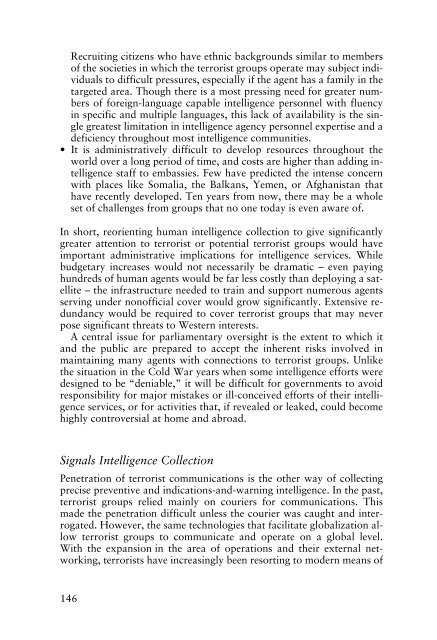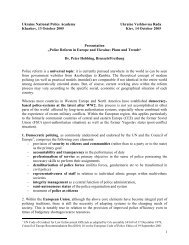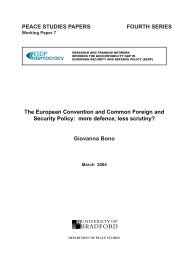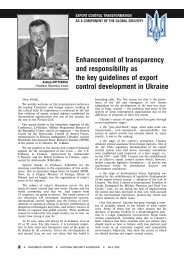combating terrorism and its implications for the security sector - DCAF
combating terrorism and its implications for the security sector - DCAF
combating terrorism and its implications for the security sector - DCAF
You also want an ePaper? Increase the reach of your titles
YUMPU automatically turns print PDFs into web optimized ePapers that Google loves.
Recruiting citizens who have ethnic backgrounds similar to members<br />
of <strong>the</strong> societies in which <strong>the</strong> terrorist groups operate may subject individuals<br />
to difficult pressures, especially if <strong>the</strong> agent has a family in <strong>the</strong><br />
targeted area. Though <strong>the</strong>re is a most pressing need <strong>for</strong> greater numbers<br />
of <strong>for</strong>eign-language capable intelligence personnel with fluency<br />
in specific <strong>and</strong> multiple languages, this lack of availability is <strong>the</strong> single<br />
greatest limitation in intelligence agency personnel expertise <strong>and</strong> a<br />
deficiency throughout most intelligence communities.<br />
• It is administratively difficult to develop resources throughout <strong>the</strong><br />
world over a long period of time, <strong>and</strong> costs are higher than adding intelligence<br />
staff to embassies. Few have predicted <strong>the</strong> intense concern<br />
with places like Somalia, <strong>the</strong> Balkans, Yemen, or Afghanistan that<br />
have recently developed. Ten years from now, <strong>the</strong>re may be a whole<br />
set of challenges from groups that no one today is even aware of.<br />
In short, reorienting human intelligence collection to give significantly<br />
greater attention to terrorist or potential terrorist groups would have<br />
important administrative <strong>implications</strong> <strong>for</strong> intelligence services. While<br />
budgetary increases would not necessarily be dramatic – even paying<br />
hundreds of human agents would be far less costly than deploying a satellite<br />
– <strong>the</strong> infrastructure needed to train <strong>and</strong> support numerous agents<br />
serving under nonofficial cover would grow significantly. Extensive redundancy<br />
would be required to cover terrorist groups that may never<br />
pose significant threats to Western interests.<br />
A central issue <strong>for</strong> parliamentary oversight is <strong>the</strong> extent to which it<br />
<strong>and</strong> <strong>the</strong> public are prepared to accept <strong>the</strong> inherent risks involved in<br />
maintaining many agents with connections to terrorist groups. Unlike<br />
<strong>the</strong> situation in <strong>the</strong> Cold War years when some intelligence ef<strong>for</strong>ts were<br />
designed to be “deniable,” it will be difficult <strong>for</strong> governments to avoid<br />
responsibility <strong>for</strong> major mistakes or ill-conceived ef<strong>for</strong>ts of <strong>the</strong>ir intelligence<br />
services, or <strong>for</strong> activities that, if revealed or leaked, could become<br />
highly controversial at home <strong>and</strong> abroad.<br />
Signals Intelligence Collection<br />
Penetration of terrorist communications is <strong>the</strong> o<strong>the</strong>r way of collecting<br />
precise preventive <strong>and</strong> indications-<strong>and</strong>-warning intelligence. In <strong>the</strong> past,<br />
terrorist groups relied mainly on couriers <strong>for</strong> communications. This<br />
made <strong>the</strong> penetration difficult unless <strong>the</strong> courier was caught <strong>and</strong> interrogated.<br />
However, <strong>the</strong> same technologies that facilitate globalization allow<br />
terrorist groups to communicate <strong>and</strong> operate on a global level.<br />
With <strong>the</strong> expansion in <strong>the</strong> area of operations <strong>and</strong> <strong>the</strong>ir external networking,<br />
terrorists have increasingly been resorting to modern means of<br />
146

















